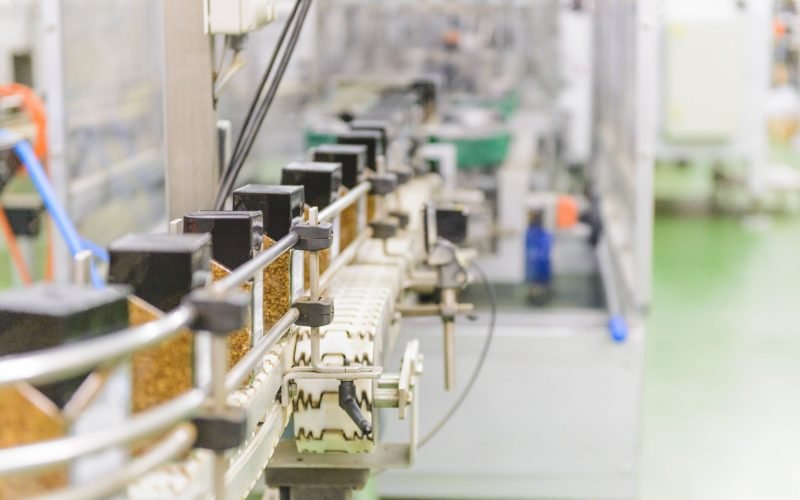Ceramic rods are vital in the food processing industry, offering superior durability, high wear resistance, and excellent hygiene properties. From food production lines to processing equipment, ceramic rods play a crucial role in ensuring food safety, efficiency, and compliance with strict industry standards. With their resistance to corrosion, ease of cleaning, and ability to withstand high temperatures, ceramic rods are an essential component in modern food manufacturing
Ceramic rods are used in a variety of applications within the food processing industry. Their durability, resistance to corrosion, and ability to handle high temperatures make them indispensable in modern food manufacturing processes.

Application:
Ceramic rods are used in food cutting and grinding equipment to reduce wear and maintain sharpness. The hardness and durability of materials like alumina and zirconia ensure that cutting blades, grinding tools, and mills retain their effectiveness even under heavy use.
Example:
In meat processing plants, ceramic rods are used in grinders and slicers to keep blades sharp and reduce the need for frequent maintenance or replacements, improving efficiency and reducing downtime.
Application:
Ceramic rods are used in conveyor systems and material handling equipment in food processing facilities. Their wear resistance and smooth surface prevent contamination and ensure that food products are transported without risk of damage.
Example:
Ceramic rods are used to line conveyor rollers and other moving parts, ensuring smooth and consistent movement of food products in packaging or assembly lines.
Application:
Ceramic rods are used in critical components of food processing equipment, including pumps, seals, and valves, due to their ability to resist corrosion and wear from food acids, oils, and other ingredients.
Example:
Ceramic rods are commonly used in food processing pumps and valves to prevent contamination while providing long-lasting performance even under demanding conditions.
Application:
In food production lines, ceramic rods are employed in heat exchangers and sterilization systems to provide excellent heat transfer while resisting corrosion. These systems are crucial for ensuring that food products are properly processed and safe for consumption.
Example:
Ceramic rods are used in the sterilization units of dairy processing plants to maintain temperature control and prevent bacterial growth during pasteurization, ensuring food safety.
Application:
Ceramic rods are used in food packaging machinery, particularly in high-speed packaging lines where precision and durability are critical. Their resistance to wear and high temperatures ensures long-lasting performance in demanding conditions.
Example:
Ceramic rods are used in packaging machines for sealing bags, ensuring precise and reliable sealing of food products, preventing contamination and preserving freshness.
Ceramic rods provide several distinct advantages that make them indispensable in food processing applications:
Ceramic rods are highly resistant to corrosion caused by acidic foods, oils, and cleaning chemicals, ensuring long-term durability and preventing contamination of food products.
Ceramic materials, particularly zirconia and alumina, exhibit exceptional wear resistance, making them ideal for high-abrasion applications like cutting, grinding, and material handling in food processing.
Ceramic rods can withstand high temperatures, making them suitable for use in thermal applications such as heat exchangers, sterilization units, and cooking equipment.
Ceramic materials do not react with food ingredients, ensuring that food safety is maintained and preventing contamination from materials that could affect taste, texture, or quality.
Ceramic rods are easy to clean and sterilize, ensuring that food processing equipment remains hygienic and compliant with food safety regulations. Their non-porous surface prevents bacterial growth.
Ceramic rods are incredibly durable, reducing the need for frequent replacements and minimizing downtime in food processing operations.

Ceramic rods are used in food processing due to their excellent resistance to wear, corrosion, and high temperatures. They are ideal for ensuring the durability and hygiene of food processing equipment, reducing maintenance costs, and preventing contamination.
The most commonly used ceramic materials in food processing include alumina, zirconia, and silicon carbide. These materials are chosen for their hardness, thermal stability, and corrosion resistance, making them suitable for a wide range of food-related applications.
Ceramic rods help improve food safety by providing materials that are non-reactive, corrosion-resistant, and easy to sterilize. This ensures that food products are handled in a hygienic environment without contamination from the equipment.
Yes, ceramic rods are designed to withstand the harsh conditions of food processing environments, including exposure to high temperatures, chemical cleaning agents, and abrasive materials, ensuring that equipment remains operational over long periods.
Yes, ceramic rods can be customized in terms of size, material composition, and surface finish to meet the specific needs of various food processing applications, including cutting, grinding, and packaging.
Ready to improve the efficiency, durability, and safety of your food processing equipment with high-performance ceramic rods? Contact us today to discuss your specific requirements and discover how our ceramic solutions can meet your needs.
We will get back to you within 12 hours.